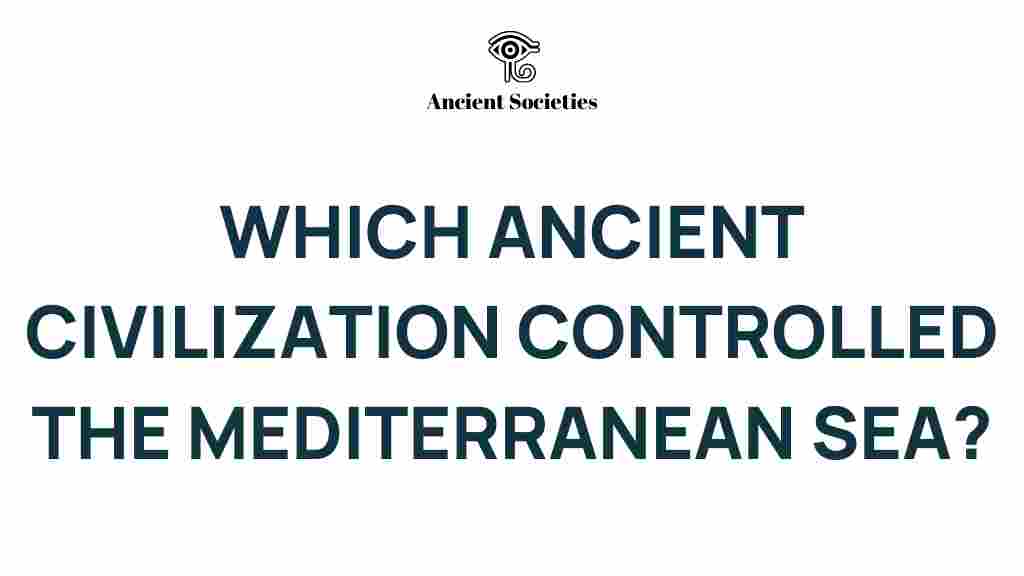Unraveling the Secrets of the Mediterranean Sea: Who Ruled the Waves?
The Mediterranean Sea has always been a crossroads of cultures, a conduit for trade, and a theater for empires vying for power. Its ancient waters have seen the rise and fall of various ancient civilizations, each leaving behind a rich tapestry of history. In this article, we will explore the maritime power dynamics of the Mediterranean, tracing the history of empires, the significance of trade routes, and the naval dominance that characterized this vibrant region.
Understanding the Importance of the Mediterranean Sea
The Mediterranean Sea is more than just a body of water; it is a historical and cultural epicenter that has shaped civilizations for thousands of years. This sea has served as a vital link between continents, allowing for the exchange of goods, ideas, and cultures. The following points highlight its significance:
- Trade Routes: The Mediterranean was integral for trade between Europe, Africa, and Asia.
- Naval Dominance: Control over the Mediterranean meant control over trade routes and resources.
- Cultural Exchange: The sea facilitated the mingling of diverse cultures and ideas.
Major Empires and Their Maritime Powers
Throughout history, several empires have emerged as dominant maritime powers in the Mediterranean. Each of these empires utilized their naval strength to control trade routes and expand their influence.
1. The Phoenician Empire
The Phoenicians, known as the great seafarers of the ancient world, laid the groundwork for maritime trade in the Mediterranean. They established city-states like Tyre and Sidon, becoming renowned for their shipbuilding and navigation skills.
- Trade Networks: The Phoenicians created extensive trade networks, reaching as far as Britain and West Africa.
- Alphabet Development: They developed one of the first alphabets, facilitating communication and trade.
2. The Greek Empire
Following the Phoenicians, the Greeks emerged as significant maritime powers. Their city-states, notably Athens, became central to naval dominance.
- Naval Innovations: The Greeks pioneered ship designs, such as the trireme, which enhanced their naval capabilities.
- Cultural Achievements: Their exploration and colonization spread Greek culture throughout the Mediterranean.
3. The Roman Empire
The Romans took maritime power to new heights, establishing the Mediterranean as a “Mare Nostrum” (Our Sea). Their naval strength allowed them to control vast territories.
- Infrastructure Development: Romans built ports and roads that enhanced trade and military logistics.
- Legal Framework: They established maritime laws that regulated trade and navigation.
Trade Routes Across the Mediterranean
The Mediterranean’s trade routes have been a lifeline for empires and civilizations throughout history. These routes were crucial for the exchange of goods, including:
- Spices and Silks: Valuable commodities from Asia.
- Grain: Essential food supplies from North Africa and the Black Sea.
- Wine and Olive Oil: Key products from the Mediterranean basin.
Control over these trade routes not only provided economic benefits but also allowed for cultural exchange, leading to the sharing of ideas, art, and technology.
Naval dominance was crucial for maintaining control over the Mediterranean. The following strategies were employed by various empires:
- Fleet Expansion: Building large fleets to patrol and secure trade routes.
- Alliances: Forming strategic alliances to counter rival empires.
- Fortifications: Constructing coastal fortifications to protect against invasions.
The Role of Archaeology in Understanding Maritime Power
Archaeology has played a pivotal role in uncovering the secrets of the Mediterranean’s past. Through excavations, researchers have discovered:
- Shipwrecks: These provide insights into ancient shipbuilding techniques and trade practices.
- Port Cities: Ruins of ancient ports reveal the scale of maritime trade.
- Artifacts: Items discovered at various sites illustrate the cultural exchanges between civilizations.
For instance, the underwater archaeology of shipwrecks off the coast of Sicily has unveiled the trade routes and goods exchanged during the Roman Empire, highlighting the Mediterranean’s role as a commercial hub.
Cultural Exchange and Its Impact
The Mediterranean Sea has always been a melting pot of cultures, influencing art, religion, and philosophy. The following points summarize its impact:
- Artistic Influences: Artistic styles from different civilizations melded to create unique forms of expression.
- Philosophical Ideas: The exchange of philosophical ideas between Greek and Roman thinkers shaped Western thought.
- Religious Developments: The spread of major religions, including Christianity and Islam, was facilitated by trade routes.
Step-by-Step Process of Maritime Dominance
To understand how empires maintained their maritime dominance, we can break it down into a series of steps:
- Establishing Naval Power: Building and maintaining a strong navy.
- Controlling Trade Routes: Securing key maritime passages and ports.
- Diplomatic Relations: Forming alliances with other powers to strengthen positions.
- Technological Advancements: Investing in shipbuilding and navigation technologies.
- Military Strategy: Developing strategies for naval warfare and coastal defense.
Troubleshooting Tips for Exploring Mediterranean History
When delving into the rich history of the Mediterranean and its empires, you might face challenges. Here are some troubleshooting tips:
- Research Varied Sources: Ensure you consult a variety of historical texts and archaeological reports for a well-rounded understanding.
- Visit Museums: Museums often have artifacts and exhibits related to Mediterranean civilizations that can provide context.
- Engage with Experts: Attend lectures or discussions led by historians or archaeologists specialized in Mediterranean studies.
Conclusion
The Mediterranean Sea has been a stage for ancient civilizations, empires, and maritime powers to rise and fall. From the Phoenicians to the Romans, each empire has left an indelible mark on the history of the Mediterranean. As we continue to explore this fascinating region, the interplay of trade routes, naval dominance, and cultural exchange remains a testament to the enduring significance of the Mediterranean in shaping human civilization.
To learn more about historical maritime powers, visit this resource. For archaeological findings related to the Mediterranean, check out this site.
This article is in the category History and created by AncientSocieties Team
